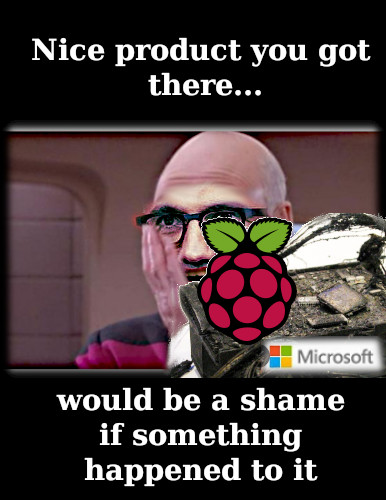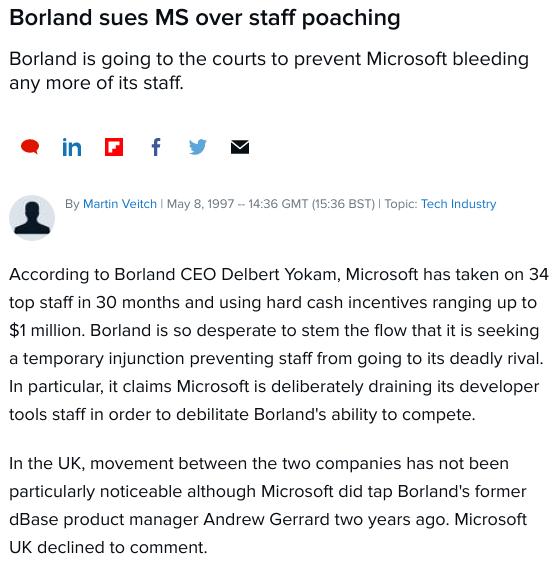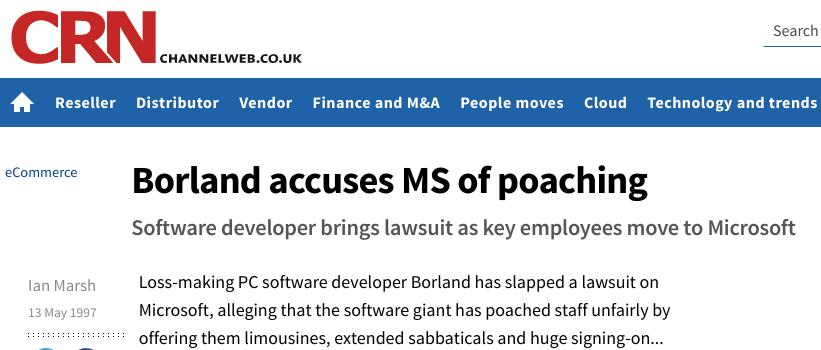

IN THE first part we explained in general terms that Microsoft is intruding entering the digital territories of its competition in order to disrupt and undermine, or simply to switch people over... back to Microsoft's proprietary software. People who believe otherwise ought to reassess their views based on objective evidence, not Public Relations stunts (e.g. "Microsoft loves Linux").
"This is no joking matters and Debian GNU/Linux developers were extremely unhappy about what the Raspberry Pi Foundation had done."We recently became aware of a bunch of worrying stories in light of the story we broke and exposed regarding Raspberry Pi and Microsoft. We've been writing a lot about that since then. In short, Microsoft is trying to leverage Raspberry Pi devices to get people 'addicted' to Microsoft's proprietary software. It can also leverage data gathered from these devices for programmes such as EDGI and leverage these secret deals to impose Microsoft traps on pupils at schools. This is no joking matters and Debian GNU/Linux developers were extremely unhappy about what the Raspberry Pi Foundation had done. Their code was being misused to prop up Microsoft monopoly, via the Raspberry Pi Foundation. It never even bothered explaining what exactly it agreed on with Microsoft and why (or what for, e.g. how much money was paid for it). Some of those developers spoke to us privately. They were definitely not happy.
Additionally, a recent story was shared with us, illuminating the sort of relationship Microsoft is trying to forge with such developers. It's akin to an absorption -- the kind of trick Microsoft used against rivals in the recent and distant past (e.g. Borland). The details may be revealing to those involved; but for those not "in the loop" the identities will remain unknown. For those who are not familiar with the Borland story, here's an old report:

Here's some raw evidence and another old article:

A month ago a recruiter/contact reached out to a GNU/Linux developer, saying: "I’d like connect w/you re: a [redacted] remote Linux Tech PM consultant w/STRONG tech doc skills."
Need: 1. Linux OS focused on OS development. 2. Embedded devices- building OS & modifying hardware, drivers. 3. Silicon architectures & embedded boards: ARM devices, [redacted]
Sorry my 1st msg was light on information. ...restricted the letter count...
HIRING [redacted]: TECHNICAL PM - LINUX. REMOTE
I am an executive recruiting consultant helping a technical consulting firm in [redacted] staff a [redacted] consultant role. Info notes below.
Skills & knowledge we are looking for: 1. Strong Linux OS skills much more focused on OS development vs App development or Sys Admin. 2. Strong experience with embedded devices-building embedded OS and modifying hardware, drivers, etc. 3. Experience with silicon architectures and embedded boards such as ARM based devices, [redacted] & Raspbery Pi. 4. 5+ years experience as a Technical PM. 5. Strong technical documentation skills. 6. Expertise with Github and related tools. 7. SME with hands-on experience that can build and customize an OS (rather than interview SMEs and write it up.)
Key knowledge & skills: (not all required but as much of this experience as possible is highly desired due to goals of this position.)
1. Embedded Linux, 2. Ubuntu, 3. Canonical, 4. Edge IOT devices, 5. Red Hat, 6. Yocto, 7. Wind River Linux, 8. ARM, 9. NXP
If you or someone you know are looking for a [redacted] Tech PM gig that requires Linux expertise, strong documentation skills and will last up to 6 months, please send your resume to me at... Thank you!
"The developer likely lost interest, seeing where the job is and words like GitHub."So there we go... those are people from Microsoft, who still work with Microsoft ("the teams").
Funny how this wasn't mentioned upfront, right?
"Oh yeah," the developer replied, "that's a good question.. will the person need to use proprietary software or is it completely free and open source?"
The contact apparently knew nothing about what s/he was talking about. The reply? "Oh! I didn’t realize they were the same!! I’ll ask about the question above which is great!"
"Yeah," the developer responded. "Canonical is the company. Ubuntu is the product/Distro..."
"Notice how they list "Ubuntu" and "Canonical" separately."In the next part we'll see that not only the team (working with "the teams" i.e. Microsoft) but also more people are in fact working for Microsoft or were working for Microsoft. Why are they trying to sort of 'poach' developers?
Remember this deals with "Raspbery [sic] Pi" and GitHub (Microsoft). That was a month ago, just about a week before the Raspberry Pi Foundation covertly inserted Microsoft keys and repositories into millions of Raspberry Pi devices.
Stay tuned for the next part. It gets better (or worse, depending on where you, the dear readers, stand). ⬆